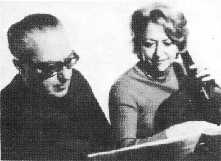That’s Why They Call It Muse-ic
From Sarah Baird:
 Aurora Natola-Ginastera, internationally renowned cello virtuoso and wife of the late composer, Alberto Ginastera (1916-1983), passed away on Sunday, January 25, in Geneva. She was 85 years old. (Alberto wrote his second Cello Concerto for her, at least. What would our repertoire look like if not for composers in love?! ) The funeral information follows. All best. ~ Sarah
Aurora Natola-Ginastera, internationally renowned cello virtuoso and wife of the late composer, Alberto Ginastera (1916-1983), passed away on Sunday, January 25, in Geneva. She was 85 years old. (Alberto wrote his second Cello Concerto for her, at least. What would our repertoire look like if not for composers in love?! ) The funeral information follows. All best. ~ Sarah
Ceremony, followed by burial:
Tuesday, Feb 3, 10 a.m. / Eglise St-Joseph / Rue Petit-Senn / 1207 Geneva
Burial:
Cimetière de Plainpalais / Rue des Rois 10 / 1204 Geneva
JB Note: Valentine’s Day is not that far away. Good time to discuss great music inspired by love.
Didn’t forget the harp concerto, but I never felt it was that great a work. Same with his quintet. Now the Cantata para america magica, or his cantata Milena—that’s really great stuff. I love his two piano concerti and his first two string quartets (never heard his third, unfortunately). And of course, his two piano sonatas.
I was fortunate to have heard Aurora Natola-Ginastera perform her husband’s Second Cello Concerto at the Kennedy Center.
And let’s not forget Ginastera’s Harp Concerto, which I also heard. Here is a recent program note to that work:
http://www.temple.edu/boyer/enp/documents/OrchestraNotes1.pdf
*
Ginestera’s ‘Bomarzo’ was, as we all know, given its world premiere in Washington, D.C. in 1967. It’s planned Argentine premiere 10 weeks later in Buenos Aires was immediately banned by Argentine President Juan Carlos Onganía. Ginestera’s opera Beatrix Cenci opened the Kennedy Center Opera House in 1971, but with different librettists (Ginastera and William Shand).
Bomarzo’s author (1962) and librettist (1967) was Manuel Mujica Láinez; who may or may not have been related –by his early marriage — to the contemporary composer, painter, and sculptor Maria de Alvear.
I see that several web-sites have both Ginastera and Manuel Mujica Láinez obtaining Pulitzer Prizes, but I cannot confirm this at the Pulitzer Prize website and believe the information to be in error. Critic George O. Schanzer has Mujica Láinez winning the John F. Kennedy Prize in 1964, along with Julio Cortazar, but I cannot confirm this either.
Mujica Láinez’s novel ‘El gran teatro’ (1980) takes place during a performance of Wagner’s Parsifal at Buenos Aires’ famous opera house, the Teatro Colón.
He is also well known for his “The journey of the seven demons” (1974).
Very sad to hear this—while I have never heard either of his cello concerti, I have or know most of his other music (Bomarzo is one I have yet to hear as well). Ginastera’s music is somewhat neglected—many years ago, it was very much in fashion. I still love his piano concerti, quartets 1-2, his two cantatas, and even his violin concerto (one of his weaker works, IMHO) has grown on me.
The first work that I can think of that was inspired by love was, interestingly enough, the Lyric Suite, which (as the late George Perle astutely pointed out), was really all about Berg’s affair with Hanna Fuchs-Robettin.